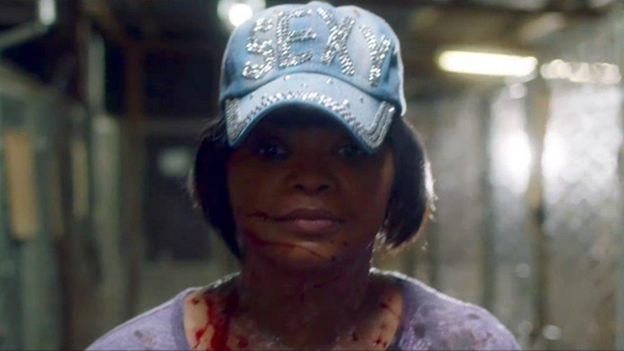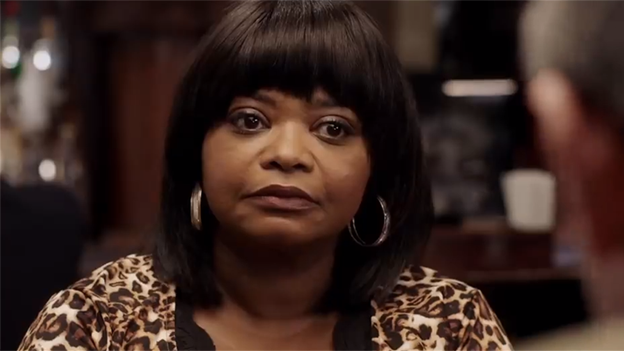Octavia Spencer has long since paid her dues. The Academy Award-winning actress has mostly been relegated to supporting roles in film—often pivotal roles, sure, but roles that cast her as the historical Other (THE HELP, HIDDEN FIGURES) without much room to stretch beyond the condescending confines of Hollywood’s canonical “Films About Black People Made By White People For White People” category. Finally, Spencer has a chance to showcase her considerable dramatic talents in a leading role: enter MA, directed by Tate Taylor (who also directed THE HELP), an odd little thriller that has Spencer play heartily with paradox in the eponymous role—equal parts tender and sinister, unassuming physicality butting heads with a primal, piledriver-esque centrifugal force, etc. MA dabbles in racial subtext that hints at a more thoughtful, intelligent picture, but Taylor opts to not dwell in it, instead foregrounding Spencer’s performance which, while terrific, never congeals into a consistent or satisfying exploration of sociopathy.
The film’s first act moves at a breakneck speed, orienting us with Maggie (Diana Silvers, fresh off her supporting role in BOOKSMART) and her mother Erica (Juliette Lewis) as they settle into their new, humdrum Ohio surroundings. Maggie, at first apprehensive about the prospect of making friends at her new school, quickly falls in with a group of popular kids who have, as all teenagers must, an unquenchable thirst for Fireball and shitty beer. An enigmatic veterinary technician named Sue Ann (Octavia Spencer) assists the kids in acquiring the alcohol, and later designates her basement as the place for the town’s minors to engage in their debaucherous proclivities, safe from prying eyes. Of course, Sue Ann—or as the kids call her, “Ma”—may have her own reasons for befriending the teens.

You’re going to see this look a lot come Halloween
MA is much less a horror movie than it is a thriller, or even a character study. Scares are basically non-existent and Taylor never locks down a real sense of dread, which is a shame considering Spencer’s commitment to the role. Taylor’s depiction of small town ennui is potent, and location photography is suitably dreary, the teens’ depressing environment giving credence to their desires to have a space entirely their own. Once things enter Ma’s basement, things quickly turn bizarre: one early scene finds Ma ordering one of the boys to strip naked at gunpoint. She laughs it off, but that this alone doesn’t compel the kids to abandon Ma and never speak to her again is quite insane; it also doesn’t really jibe with the Sue Ann character—surely someone as lonely as she would not risk her freshly minted friendship with these kids for an aggressive and inappropriate gag.
We’re treated to intermittent flashbacks of Sue Ann’s high school years that detail the origins of her trauma—a cruel and humiliating prank executed by a dashing jock with whom Sue Ann is smitten. It’s interesting to note Sue Ann’s transformation between the two time periods: high school Sue Ann is meek and socially clumsy, where modern Sue Ann, despite her eccentricities, presents as a fairly well-adjusted person, replete with great comic timing. The filmmakers also aren’t sure if Sue Ann is a legitimate sociopath; her charm and capacity for manipulation points to this, but we also see her express pungent sadness in moments which do not appear to be performative in nature. It’s a confused characterization. Taylor also botches the racial material: there are allusions to white face and African masks, but these are flippant and unexplored—one wonders how the film might’ve resonated had Taylor really dived into the racial melancholia of it all.

Yes, this one as well
Spencer is a wonderfully dynamic screen presence, oscillating between polar opposite emotions like a champ and always doing her best to make Sue Ann a formidable villain, even though the script doesn’t allow for much nuance. Less successful is Diana Silvers as Maggie: she’s somewhat blank here, and any dimension that could’ve been attributed to her character is applied to the other teens instead. Those teens (some of whom are actually pretty compelling) also vanish from the movie for long periods of time, which doesn’t seem so much a directorial choice as a case of dramaturgical laziness. MA bungles its climax (which is inexplicably set during the daytime, a decision I thought we all agreed long, long ago doesn’t work for a suspense film?) and especially its final moments, which border on distasteful. Still, for the majority of the runtime, MA is absolutely fine, and if you like Octavia Spencer, you’ll like it too. Here’s hoping this is just the start of her leading lady career.
















Comments